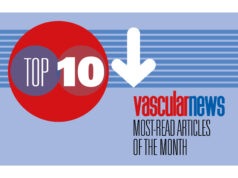 A new vascular medicine registry will be launched in early 2017 by the Society for Vascular Surgery (SVS) and the Society for Vascular Medicine (SVM).
A new vascular medicine registry will be launched in early 2017 by the Society for Vascular Surgery (SVS) and the Society for Vascular Medicine (SVM).
The registry will be housed within the SVS Patient Safety Organization (SVS PSO), which was established to collect and analyse data to improve the quality of vascular care, in a neutral, de-identified environment.
This will be the first data registry to study outcomes of medical management as compared to interventional and surgical treatments.
“This is a paradigm shift from looking at procedure impact only,” says Randall R DeMartino, a Mayo Clinic (Rochester, USA) vascular surgeon and co-chair of the Vascular Medicine Registry. “This new registry will allow us to compare the full spectrum of treatment options for patients with vascular disease, in order to define the best treatment for each patient.”
The new registry allows physicians to look at the entire patient, says Michael R Jaff, vascular medicine specialist at Massachusetts General Hospital (Boston, USA) and co-chair of the registry. “We can see if we have done enough to keep them healthy. We can understand in greater detail how cardiovascular risk factors are managed and how that impacts patient outcomes.”
The new registry will evaluate the treatment and outcomes of patients with carotid artery stenosis, abdominal aortic aneurysm and lower extremity peripheral artery disease. For these conditions, the registry will focus on non-operative medical management approaches—identifying optimal medication and dosages, evaluating best methods for secondary prevention (e.g. blood pressure, lipid control) and assessing the need for subsequent interventional treatment.
The new registry will not just track clinical outcomes—which provide crucial information for providers and researchers—but will provide useful information for patient decision-making as well.
Practitioners will need to follow patients for at least one year to determine the success of medical treatment, and those visits could also reveal additional, hidden conditions.
“Long-term follow-up is a mechanism for maintaining a connection and providing good preventive care,” says DeMartino. “Vascular specialists are well known for developing long-term relationships with their patients, but this will expand the practice and provide practical guidance on the advantages of medical versus interventional or surgical care.”
After the registry begins enrolment, SVS PSO leaders anticipate that it will have comprehensive patient tracking data within one to two years.
In addition to surgeons, registry providers will include family practitioners, internists, non-surgical interventionists and other clinical practitioners who treat vascular patients.
“We expect that over the long run we will see more physician specialties working together and sharing information on patient management,” Jaff says. “Right now, a vascular surgeon may require input about the ongoing medications, such as statins, that their patients are taking long term, and internists may need to learn more about vascular surgical outcomes.”












